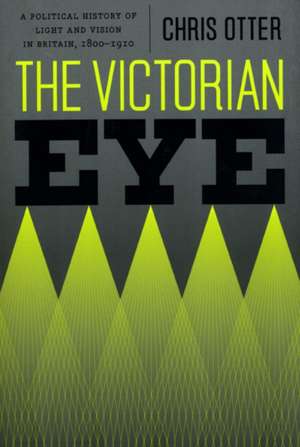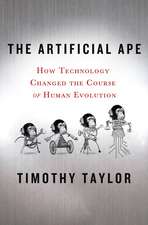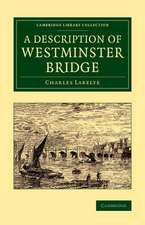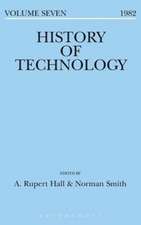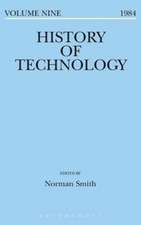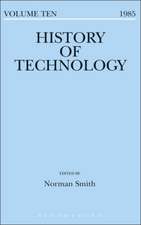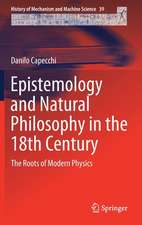The Victorian Eye: A Political History of Light and Vision in Britain, 1800-1910
Autor Chris Otteren Limba Engleză Paperback – 6 noi 2008
During the nineteenth century, Britain became the first gaslit society, with electric lighting arriving in 1878. At the same time, the British government significantly expanded its power to observe and monitor its subjects. How did such enormous changes in the way people saw and were seen affect Victorian culture?
To answer that question, Chris Otter mounts an ambitious history of illumination and vision in Britain, drawing on extensive research into everything from the science of perception and lighting technologies to urban design and government administration. He explores how light facilitated such practices as safe transportation and private reading, as well as institutional efforts to collect knowledge. And he contends that, contrary to presumptions that illumination helped create a society controlled by intrusive surveillance, the new radiance often led to greater personal freedom and was integral to the development of modern liberal society.
The Victorian Eye’s innovative interdisciplinary approach—and generous illustrations—will captivate a range of readers interested in the history of modern Britain, visual culture, technology, and urbanization.
Preț: 273.97 lei
Nou
Puncte Express: 411
Preț estimativ în valută:
52.43€ • 54.16$ • 43.64£
52.43€ • 54.16$ • 43.64£
Carte tipărită la comandă
Livrare economică 25 martie-08 aprilie
Preluare comenzi: 021 569.72.76
Specificații
ISBN-13: 9780226640778
ISBN-10: 0226640779
Pagini: 392
Ilustrații: 65 halftones
Dimensiuni: 152 x 229 x 25 mm
Greutate: 0.54 kg
Ediția:New.
Editura: University of Chicago Press
Colecția University of Chicago Press
ISBN-10: 0226640779
Pagini: 392
Ilustrații: 65 halftones
Dimensiuni: 152 x 229 x 25 mm
Greutate: 0.54 kg
Ediția:New.
Editura: University of Chicago Press
Colecția University of Chicago Press
Notă biografică
Chris Otter is assistant professor of modern European history at the Ohio State University.
Cuprins
Illustrations
Acknowledgements
Introduction: Light, Vision, and Power
1. The Victorian Eye: The Physiology, Sociology, and Spatiality of Vision, 1800-1900
2. Oligoptic Engineering: Light and the Victorian City
3. The Age of Inspectability: Vision, Space, and the Victorian City
4. The Government of Light: Gasworks, Gaslight, and Photometry
Acknowledgements
Introduction: Light, Vision, and Power
1. The Victorian Eye: The Physiology, Sociology, and Spatiality of Vision, 1800-1900
2. Oligoptic Engineering: Light and the Victorian City
3. The Age of Inspectability: Vision, Space, and the Victorian City
4. The Government of Light: Gasworks, Gaslight, and Photometry
5. Technologies of Illumination, 1870-1910
6. Securing Perception: Assembling Electricity Networks
Conclusion: Patterns of Perception
Notes
Bibliography
Index
Recenzii
“The Victorian Eye is a spectacular debut. Meticulously researched, theoretically imaginative, and elegantly written, it should be read by all those interested in the histories of vision, technology, the environment, and liberal government. A thoughtful, provocative, and often funny book, this is history as it should be written.”
“This excellent volume offers an important new historicist interpretation of the interaction of technology, vision, and power in the late nineteenth century. Otter dexterously evinces the new socio-technical patterns of perception that emerged in the British liberal state as its urban environments were transformed by the arrival of gas and electric lighting. This work is essential reading, especially for those dissatisfied with twentieth-century clichés of the panopticon and the flâneur as modes of appreciating the nexus of materiality, mobility, and management in civic life.”
“Otter's analysis is complex as he moves from one technology or institution to another, but it is always lucid and well informed. . . . The study ranges across a wide and eclectic array of British urban spaces, technologies and institutions, and every page is consistently readable and stimulating."
"A rich history full of previously understudied spaces, objects and connections. . . . In leaving the focus on surveillance and spectacle aside, the breadth of topics of historical interest increases dramatically. In this regard, The Victorian Eye should be commended for its originality and ambition."
